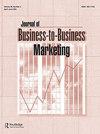Stop making excuses: reducing unethical behavior and improving performance and relationship quality
IF 2.5
4区 管理学
Q3 BUSINESS
引用次数: 0
Abstract
ABSTRACT Purpose The premise of this article is to investigate the role of neutralization techniques by business-to-business salespeople as they influence ethical views and impact unethical behaviors, performance, and relationships. Research has previously noted the prevalence and impacts of excuse-making by individuals. Identified as neutralization techniques, these practices have been linked to salespeople in both academic and practitioner literature, but remain chiefly unexplored in terms of impacts on individual outcome measures. Methodology The data used in this research are from a sample of 240 business-to-business salespeople collected electronically by using the online platform of a national data broker. A scenario presented a typical sales activity previously determined to be unethical. The salespeople were asked to evaluate the level of harm (Moral Intensity) of an activity described in a scenario and indicate their agreement/disagreement with possible justifications (Neutralization techniques). The two most common types are denial of injury where the accused claims there is no harm resulting from the unethical act and appeal to higher loyalties which involves the unethical actor claiming the unethical behavior was committed on behalf of loyalty to some other party, rather than the norms guiding expected ethical behavior. Self-reports were made about their ethical/unethical behaviors, relationship quality with customers and estimates of their performance in their sales position. All constructs as shown in the Figure were combined in a structural equation model. SPSS/Amos software was used to conduct multivariate analysis. Confirmatory factor analysis was used to assess the measurement properties of each construct, while structural equation modeling was applied to evaluate the hypothesized relationships. Findings Moral intensity was found to directly reduce unethical behaviors as moderated by neutralization techniques (excuses). Unethical behaviors were negatively related to relationship quality and value enhancing behavior performance. The results from this study lend credence to ethical decision-making models and serve to extend our understanding of them, specifically as applied to business-to-business salespeople. In particular, we learn more about the role of neutralization techniques in affecting the ethical decision-making of salespeople. In terms of the theoretical contribution, this study explores a seller’s perspective of moral intensity, neutralization techniques, and important sales behaviors and outcomes to extend findings reported in previous studies. Previous research suggests that unethical behaviors by salespeople can negatively impact both their performance in creating customer value and the quality of their customer relationships. This study extends previous research as to how neutralization techniques may work in this process and relate salesperson unethical behavior negatively to relationship quality among a broader sample of business-to-business salespeople. Research Implications Our research strengthens the importance of moral intensity in ethical decision-making by finding it is negatively related to business-to-business salespeople’s unethical behavior. Salespeople’s “detachment” from the company does not appear to lessen the power of moral intensity in ethical decision-making within the organization. Excuses or neutralization techniques are found to moderate the relationship between moral intensity and unethical behavior such that excuses may reduce the perceived harmfulness or moral intensity and be less likely to dissuade unethical behavior. The salesperson who uses excuses for unacceptable behavior is less likely to let the seriousness of harm resulting from a behavior deter him or her from acting unethically. This study adds to our research regarding ethical decision-making by examining associated outcomes such as relationship quality and performance which have received little attention concerning ethical decision-making in business-to-business sales research. While salesperson behavior performance has received research attention, little focus has been placed specifically on factors considered by buyers as the most important activities salespeople can do to add value to a customer relationship (i.e., value enhancing behavior performance). While sound moral judgment will result in positive value enhancing behaviors, unethical behavior, presumably resulting from immoral judgment, is associated with lower levels of salesperson value enhancing behavior. Practical Implications The study makes a practical contribution through an improved understanding of how a seller’s ethical perspective relates to their use of excuses and their ethical behaviors, relationships and performance with customers. The findings underscore the importance of engaging in activities to reduce unethical behavior, which is critical given it can detrimentally affect relationship quality. Because unethical behavior may be perceived by some salespeople as a shortcut to achieve desired ends, organizations will benefit from taking steps to increase moral intensity perceptions and reduce the use of neutralization techniques to help salespeople understand the connection between what they may consider inconsequential indiscretions (e.g., misleading a customer on a delivery date; overpromising, etc.) and relationship quality, thus reducing the chances salespeople will commit such questionable acts. An improved understanding of business-to-business salespeople’s perspectives of the variables under study can potentially improve the hiring and training of salespeople to adopt high moral ethics, avoid excuse-making, commit less frequent unethical behavior, build customer relationships and improve sales performance. Originality/Value/Contribution of the paper The originality and value of this study rest with proposed connections between three prevalent issues in business-to-business sales organizations. Moral intensity, interpretations of the potential harm of sales actions, the ongoing existence of excuse-making, and their connections between unethical behaviors and relationship performance provide valuable and unique insights into business-to-business selling behaviors and seller consequences.停止找借口:减少不道德的行为,提高绩效和关系质量
摘要目的本文的前提是调查企业对企业销售人员的中和技术的作用,因为它们影响道德观点和影响不道德行为,绩效和关系。之前的研究已经注意到个人找借口的普遍性和影响。这些做法被认为是中和技巧,在学术和实践文献中都与销售人员联系在一起,但在对个人结果测量的影响方面,这些做法主要是未被探索的。本研究中使用的数据来自240名企业对企业销售人员的样本,通过使用国家数据经纪人的在线平台以电子方式收集。一个场景展示了一个典型的销售活动,之前被确定为不道德的。销售人员被要求评估在一个场景中描述的活动的危害程度(道德强度),并表明他们对可能的理由的同意/不同意(中和技术)。两种最常见的类型是否认伤害,被告声称不道德的行为没有造成伤害,并呼吁更高的忠诚,这涉及不道德的行为者声称不道德的行为是代表对另一方的忠诚而进行的,而不是指导预期道德行为的规范。对他们的道德/不道德行为、与客户的关系质量以及对他们在销售岗位上的表现的估计进行了自我报告。将图中所示的所有构式组合成结构方程模型。采用SPSS/Amos软件进行多因素分析。验证性因子分析用于评估每个结构的测量特性,而结构方程模型用于评估假设关系。研究发现,通过中和技术(借口),道德强度可以直接减少不道德行为。不道德行为与关系质量和价值提升行为表现呈负相关。这项研究的结果为道德决策模型提供了可信度,并有助于扩展我们对道德决策模型的理解,特别是应用于企业对企业的销售人员。特别是,我们更多地了解了中和技术在影响销售人员道德决策中的作用。在理论贡献方面,本研究探索了卖家的道德强度、中和技术、重要销售行为和结果的观点,以扩展先前研究的结果。先前的研究表明,销售人员的不道德行为会对他们创造客户价值的表现和客户关系的质量产生负面影响。这项研究扩展了先前的研究,即在这一过程中,中和技术如何起作用,并在更广泛的企业对企业销售人员样本中,将销售人员的不道德行为与关系质量负向联系起来。我们的研究通过发现道德强度与企业对企业销售人员的不道德行为呈负相关,加强了道德强度在道德决策中的重要性。销售人员与公司的“分离”似乎并没有减少组织内部道德决策中道德强度的力量。研究发现,借口或中和技术可以调节道德强度和不道德行为之间的关系,因此借口可能会降低感知到的危害或道德强度,并且不太可能阻止不道德行为。为不可接受的行为找借口的销售人员不太可能让行为造成的严重伤害阻止他或她做出不道德的行为。本研究通过考察关系质量和绩效等相关结果,增加了我们关于道德决策的研究,这些结果在企业对企业销售研究中很少受到道德决策的关注。虽然销售人员的行为表现受到了研究的关注,但很少有人特别关注买家认为销售人员可以为客户关系增加价值的最重要的活动(即价值提升行为表现)。健全的道德判断会导致积极的价值提升行为,而不道德的行为,可能是由不道德的判断导致的,与较低水平的销售人员价值提升行为相关。本研究通过更好地理解卖家的道德观点与他们使用借口、道德行为、与客户的关系和绩效之间的关系,做出了实际贡献。研究结果强调了参与活动以减少不道德行为的重要性,这是至关重要的,因为它会对关系质量产生不利影响。
本文章由计算机程序翻译,如有差异,请以英文原文为准。
求助全文
约1分钟内获得全文
求助全文
来源期刊
CiteScore
2.20
自引率
35.70%
发文量
22
期刊介绍:
The Journal of Business-to-Business Marketing® encourages diversity in approaches to business marketing theory development, research methods, and managerial problem solving. An editorial board comprised of outstanding, internationally recognized scholars and practitioners ensures that the journal maintains impeccable standards of relevance and rigorous scholarship. The Journal of Business-to-Business Marketing features: •basic and applied research that reflects current business marketing theory, methodology, and practice •articles from leading researchers covering topics of mutual interest for the business and academic communities

 求助内容:
求助内容: 应助结果提醒方式:
应助结果提醒方式:


